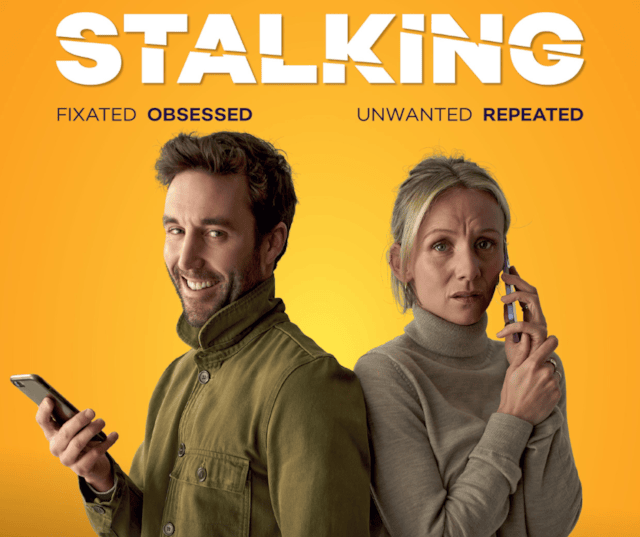Wiltshire Police and the Office of the Police and Crime Commissioner (OPCC) have joined together to launch an anti-stalking campaign using a video styled as a romantic comedy film trailer.
The film trailer will be promoted on television, online, at supermarkets and on the buses and is designed to actively encourage stalking victims to report the crimes.
It portrays a couple who initially appear to be happy, but soon it becomes clear that stalking is affecting their relationship.
It shares the mnemonic, FOUR: Fixated, Obsessed, Unwanted, Repeated, to help people understand and identify the issue.
Stalking is a pattern of fixated, obsessed, unwanted and repeated behaviour which can leave you feeling scared or distressed. You do not have to be threatened with violence to be a victim of stalking. It can be any kind of persistent, unwanted contact which causes distress.

The campaign aims to educate on the 'red flags' which are common in the early stages of stalking but are sometimes misidentified as harmless or even desirable behaviours - a myth often perpetuated through romantic comedies.
Assistant Chief Constable Mark Cooper said: “This campaign is encouraging victims and their families to spot the signs of stalking, how to report it and get support from organisations across Wiltshire and Swindon.
“Stalking is an intrusive crime, victims are endlessly harassed, their private lives completely intruded. The dangers of stalking should not be overlooked. Stalkers can change their behaviours and as they do, the risk to victims increases.
“We hope that any victims who see this campaign know they can report to us or seek support from FearFree or Swindon Domestic Abuse Support Service.
“At Wiltshire Police we work hard with partners to protect victims and pursue perpetrators.”
Recent stats show that from May 2023 to April 2024, 503 stalking crimes were reported to Wiltshire Police, 84% of those reported crimes involved a woman as the victim. And 40% of all stalking crimes involve the use of technology.
Police and Crime Commissioner Philip Wilkinson said: “The seriousness of stalking and the damaging effects it has on victims has been highlighted recently in the media with several hit series being based on real-life, high-profile cases.
“With this heightened public interest and awareness of stalking, we must ensure that victims of these incredibly invasive crimes are being encouraged to report behaviours that fit into the FOUR framework to Wiltshire Police, as well as having access to the best support available through our work with organisations such as FearFree, Swindon Domestic Abuse Support Service, Horizon and Victim Support – regardless of whether or not they’ve reported a crime to the police.
“We’re already taking steps to do that, and the OPCC have recently run stalking workshops which enabled organisations who work with victims to come together and share ideas and talk about how we can achieve best practice.
“This along with working closely with the force to ensure better internal training for officers and raising awareness of the impact of stalking will contribute towards improving the experience of victims – a clear priority in my police and crime plan.”
For further advice about spotting the signs of stalking and how to report it and seek support, visit www.wiltshire.police.uk . In an emergency always call 999.
If you are not sure if you are being stalked you can contact the National Stalking Helpline: https://www.suzylamplugh.org/pages/category/national-stalking-helpline or 0808 802 0300.
The Domestic Violence Disclosure Scheme gives any member of the public the right to ask the police if their partner may pose a risk to them. It is often called 'Clare's Law.’ This scheme also allows a member of the public to make an enquiry into the partner of a close friend or family member. For more information on this visit: https://www.wiltshire.police.uk/rqo/request/ri/request-information/cl/triage/v2/request-information-under-clares-law/?rid=73562
If you feel you may be being stalked, here is a list (non-exhaustive) of the signs:
- Getting unexpected visits to your home or place of work
- Having persistent phone calls, messages or contact over social media
- Receiving unwanted gifts or items turning up at your address
- Someone interferes or damages with your property, or breaking into your home
- Someone hanging around where they know you visit
- The stalker contacts your family, friends and colleagues to gain information about you, or make complaints
- You receive verbal abuse and/or public humiliation
- Hacking into your social media or your emails
- Spreading rumours/discrediting you
- Threats made against you, your family and your friends
- You are blackmailed
- The stalker seeks physical proximity by applying for jobs where you work; joining the same gym; church; professional/social sports groups or clubs; moving into the same neighbourhood or building
- Identity theft – the stalker pretends to be you
- Running up debt in your name
- Planting spyware - viruses on your computer/laptop
- Tracking your location
Want to know what’s on in Calne? Visit our local events page for listings and to find out how to add your own events for free. Follow us on Facebook, Twitter and Instagram to keep up with all the latest news. Have you got a story for us? Email editor@calnenews.com.




